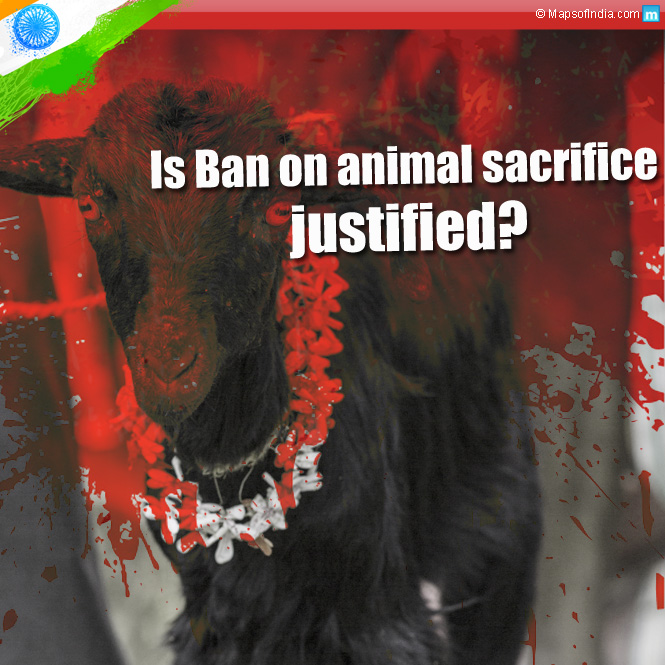Recently, the Himachal Pradesh High Court in a landmark judgment banned all animal sacrifices at religious places.
Responding to a petition filed by Sonali Purewall in 2012, the court said that the practice of animal slaughter at religious places on religious occasions was barbaric and an evil social practice that had no place in today’s modern era and instructed the State administration including the police, to ensure compliance of the ban.
India is a kaleidoscope of cultures, communities, religions, languages all having deep roots in time. Over the years all have evolved their own traditions, social practices and rituals. The range and variety of rituals followed in Hinduism is perhaps more than any other religion or cult.
Is ban on animal sacrifice justified?
Going back to Vedic times, animal sacrifice had been very much a part of social and religious practice, though the form and times of celebration have evolved with time. In the context of the judgment, Himachal Pradesh has followed several ritualistic traditions that has been part of their socio-religious fabric and animal sacrifice during festivals has been one of them. So this brings forth the question, is the ban on animal sacrifice justified?
There are several view points on these depending on which side of the fence you are sitting on. The ones that argue in favour say that it is a personal matter of faith and belief that leads to a religious ritual and they have every right to follow and practice what has been an age old tradition. Therefore, the courts do not have any right to interfere in the matter of faith.
On the other hand, those like the petitioner say that animal sacrifice as a ritualistic practice is animal cruelty and has no place or significance in modern times. Their point of view is that the animal undergoes severe trauma in anticipation of the sacrifice and the process itself is barbaric and cruel. Therefore, this tradition of animal sacrifice during festivals has to be broken and the practice done away with.
Law against religion and faith
This brings to light the age-old debate about faith vs logic, faith vs humanity, and faith vs law. Religion is a very sensitive matter and any debate regarding it evokes strong and often passionate reactions. In this case, the court has given the ruling but a section of the local community plans to appeal against the court judgment by seeking a review.
The appeal is being planned by the Kullu legislator and custodian of the Raghunath temple, Maheshwar Singh, who also represents the Dev Samaj. According to him, the practice of animal sacrifice is a matter of belief and has been practiced for generations. He plans to call a Dev Sansad, where they invoke the deities and take their opinion on various matters. It remains to be seen how this plays out in future.
However, this brings us back to the question on whether the practice is right or wrong? The issue here involves animal cruelty that is now being opposed by all civilized societies the world over. Is there a distinction between killing for food and sacrifice for a ritual? Both involve killing of the animal and in both cases the animal undergoes severe trauma, therefore how can one make a distinction between the two.
It was a result of this debate that the abattoirs (place where animals are slaughtered) in the West were forced to review their methods of killing the animal. Today, the abattoirs in the US and most of those in Europe, stun the animal prior to killing it. Thereby, reducing the pain and trauma, to a large extent.
Those against animal cruelty and non-vegetarianism still argue on the ethics of killing in the first place, rather than debate on the means of doing so. So where does one draw the line? Is killing for food more important than sacrificing for a ritual?
And the debate gets further complicated when you throw in religion. In a country like India, that accommodates all cultures and religions, striking a right balance between religion and law, religion and society, religion and ritual, can be very challenging.
Muslim community’s Bakr-Id
While this judgment pertains to a practice in a specific State and has its impact on the practices of the Hindu community, the bigger question is, what about the practice of animal sacrifice by the Muslim community during Bakr-Id? Would this judgment have any impact on the Muslim community in the state? Does the judgment apply to all faiths? After all, the animal suffers the same, irrespective of the community.
The problem in India is that the moment the judiciary starts to take a position on any social or religious practice, each community feels extremely threatened to a point that not reacting is seen as a sign of weakness within the community and therefore, the protest is loud and very public. And as in most matters, politics takes over, thereby drowning any chance of a logical debate. It remains to be seen how this plays out in courts and out of it.
This issue does raise the debate between tradition and modernity. For instance, the debate is still open in Europe that prides itself as being modern and progressive. In Spain, we have bull fighting, which is pretty cruel to the animal, as also the bull racing in the streets of Spain. There is a large section of population that is for it, while an equally large number oppose it on grounds of cruelty.
Tradition vs modernity
Ditto for the ‘fox hunting’ which is an upper class hobby, in good old England. There is a strong and vocal lobby in support of the practice, where bloodhounds are released to chase a frightened fox with the so-called hunters in tow and mounted on horses. Here again there is a raging debate on tradition vs modernity, which represents a voice against animal cruelty.
The question is, do we need to change with times and realign our traditional views and practices? Will the change truly impact our lives in a negative way? How do we strike a balance between change and heritage? Heritage is the inherited amalgamation of tradition, culture, objects, monuments and practices that defines our past and forms the basis from where we have evolved. So do we change or tinker with our heritage? After all, isn’t religion our heritage too?
Yet, if we do not evolve with time, some aspects of tradition can hold us back from progressing into the future. After all, the way we dress has changed over time, hasn’t it? But while we are not as sensitive regarding the dress, we tend to be very sensitive with matters of deep faith.
The question on whether animal sacrifice in religious places is right or wrong remains open to debate. But what is essential to note is that in heterogeneous society like ours, change is best accepted when it comes from within, both in the case of an individual or community.
The need today is for all of us to look within and seek answers to questions that may be asked by yourself or from someone outside. The answers will always lie within you. It does not matter which side of the view point you are on but the fact that you are open to another view point, will only make you a stronger person.
So now ask yourself: Is the ban on animal sacrifice at religious places justified?





